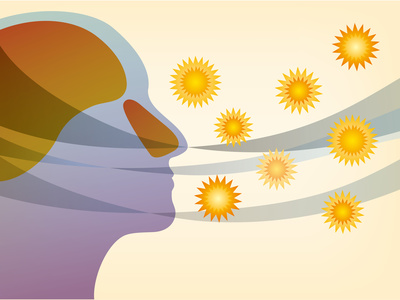Neurexpert: bringing brain matters to you
Sniffing out a new treatment strategy for depression
Depressed? Suck it up!
by Carolyn Lacey, 13 July 2015
Ok, ok… don’t get mad at me. Yes. The title of this blog does tell you to “suck it up” if you are depressed. But anybody who has encountered depression will know that it’s not something that can just be dismissed with a phrase such as “suck it up” or even “smile, it doesn’t hurt” and “turn that frown upside down”. So, before you stop reading, hear me out, because I am going to tell you about new research that could improve treatment outcomes for sufferers of Major Depressive Disorder (only about 350 million people Worldwide).

There are many problems with commonly prescribed anti-depressants: they either don’t work for some people; they get metabolized before reaching the brain in high enough concentrations to be effective; or, and this is a big one: they take a long time to work (and I’m not even going to mention side-effects). When it comes to delivering better drugs to the brain to treat depression, scientists have a massive roadblock: the impressive Blood Brain Barrier.
This barrier is very efficient at keeping everything foreign out of the brain (ordinarily a great feature!). In fact, less than two percent of drugs developed can get through. The study that I am going to talk about today published in Molecular Psychiatry, led by Albert Ferrés-Coy in Analia Bortolozzi’s lab at the Institut de Investigacions Biomediques IDIBAPS of Barcelona, and the Institute of Biomedicine and Biotechnology of Cantabria, demonstrates fast and effective relief of depression symptoms by sucking-up an anti-depressant through the nose.
Commonly prescribed anti-depressants (such as Sertraline and Fluoxetine a.k.a. Prozac) target a brain chemical often associated with mood called serotonin. The amount of serotonin released by a serotonin-containing neuron is self-regulated through molecules known as transporters. These transporters clean-up excess serotonin and take it back into the neuron to be used again. This process is known as selective re-uptake. Anti-depressants block the serotonin transporters and so prevent re-uptake, resulting in more serotonin available for action. In short, the theory is that more serotonin means less depression symptoms. As I mentioned above, getting drugs into the brain to treat mental illnesses and other brain disorders is extremely difficult. Albert Ferrés-Coy and team took the anti-depressant sertraline and combined it with a gene therapy system that silenced the serotonin transporter gene, thereby reducing the number of serotonin transporters (remember that less transporters to clean-up serotonin means more serotonin for action and less depression). And, here’s the best part, they put this treatment in a nasal spray. The nose circumvents the problem of the blood brain barrier as it contains many blood vessels and olfactory (smell) nerves that provide an express line to the brain (a trait long exploited by abusers of drugs like cocaine).
In order to test the efficacy of this nasal spray anti-depressant, the researchers administered it to mice for a week and looked for several key brain changes that are the hallmark of anti-depressant action. These changes are things like: increased serotonin, new neurons and more connections between neurons. The researchers also compared this anti-depressant in a nasal spray to fluoxetine that was given by injecting it into the abdomen of the mouse. What they found was remarkable. On every single test the nasal spray achieved the same result as Fluoxetine within a week, while Fluoxetine took at least a month! In order for these brain changes to be valuable to a depressed individual, they must result in a change in depression symptoms. In this study the researchers made the mice appear depressed by giving them a stress hormone produced in the adrenal gland called cortisol. Giving mice a small amount of this stress hormone every day for over a month can lead to depression symptoms. Researchers then measure depression in mice by testing for things like ability to feel pleasure (in this case eating sugar), interest in eating sugar in a new place and its desire to “fight”. As mentioned before, anti-depressants taken orally have a long lag time before they work, if at all. However, in this study, the “depressed” mice that were administered the new nasal spray once a day were relieved of their symptoms within a week (fluoxetine that took one month to have similar effects).
Anti-depressants have long been thought to be inadequate for the treatment of Major Depressive Disorder. The problem is that the development of more effective anti-depressants is hindered by the ability to get them into the brain when taken orally as the formidable barrier between blood vessels and what we think of as “brain” (neurons etc.) is a very effective! This study demonstrates the feasibility of quickly treating depression with a low-dose anti-depressant in a nasal spray. So the new drug is high-efficacy, it works fast and it can be taken in pretty low doses. It also means that it could avoid some of the side-effects of taking anti-depressants orally, such as nausea. Development of drugs that can be sucked-up through the nose (the nasal drug delivery system) will expand the availability of treatment for brain illnesses. So, depressed? In the future you may have to suck it up!
To view the original paper discussed in this blog (open access!) “Therapeutic antidepressant potential of a conjugated siRNA silencing the serotonin transporter after intranasal administration” in Molecular Psychiatry please click here.
Find out more about gene therapy please click here.
The Blog was written by Carolyn Lacey, Scientific Outreach Manager at Neurexpert. To learn more about Carolyn and Neurexpert, please click here.
Tweet Follow @neurexpert